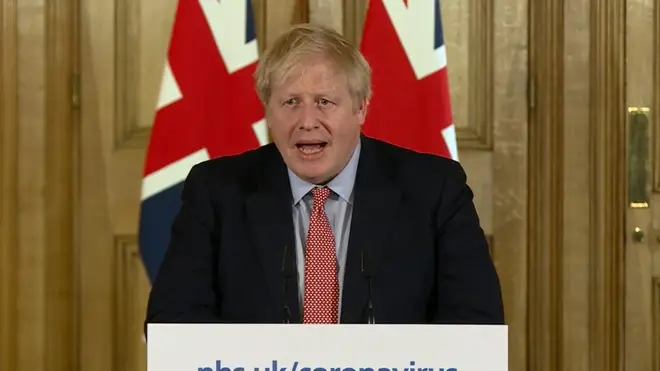
Henry Riley 7pm - 10pm
12 March 2020, 17:02 | Updated: 13 March 2020, 07:16
The Prime Minister has warned coronavirus is the "worst public health crisis in a generation" as the UK government moves to the "delay" stage of tackling the virus.
Boris Johnson announced the escalation after chairing emergency crisis talks with senior ministers at Downing Street on Thursday.
He said this was he "worst public heath crisis in a generation" and warned "many more families are going to lose loved ones before their time."
He added: "The most important task is to protect our elderly and most vulnerable during the weeks when there is the maximum risk of exposure
"The most dangerous period is not now but many weeks away."
The delay phase of the response to the outbreak is the stage that comes directly after the governments 'containment' efforts. A series of measures were brought into effect to delay the spread of the virus, including:
From Friday, if you have a persistent cough or fever, you must self-isolate for at least seven days.
Even if you only have mild symptoms of Covid-19, you are advised to stay home for at least seven days.
Anyone over 70 is advised against going on cruises and schools have been warned against international school trips
The government has not banned public gatherings, but is "considering" doing so to events such as sporting fixtures.
Schools have also not been suspended, as "scientific advice" has indicted that would do "more harm than good".
READ MORE: Latest updates on coronavirus LIVE

The government's Chief Scientific Advisor Sir Patrick Vallance said the UK is currently four weeks behind Italy - which has been placed on lockdown with more than 15,000 confirmed cases and over 1,000 dead.
The current UK death toll stands at 10, the the number of confirmed cases at 590.
But the true figure, he said, is likely to be between five to ten thousand.
He also said the UK needs to both delay the peak of the outbreak and push it towards summer to ease the impact on the NHS.
On the topic of schools, Sir Patrick said there would be a "minimal effect" from closing schools, and they would need to be closed for 13-16 weeks for the measure to be effective.
The delay strategy seeks to slow down transmission of COVID-19 between people in order to reduce the amount of pressure already being placed on the NHS, and to buy more time to find a vaccination.
Delaying the virus spread could also push the peak of cases into summer months, when viruses are often less contagious and the NHS is under less pressure.
According to the government's plan, the "social costs" that would need to be enforced to delay the spread could include urging people to work from home, shutting schools and cancelling large events or gatherings.
"Some of these will have social costs where the benefit of doing them to delay the peak will need to be considered against the social impact," the action plan said.
It comes after the World Health Organisation upgraded the status of the illness to a pandemic on Wednesday.
This declaration signals the global spread of a new and contagious disease.
The UK has so far recorded 459 cases of the virus with eight deaths, according to data from Johns Hopkins University.
Globally, more than 127,000 people have tested positive, while more than 4,700 people have lost their lives.
The majority of cases and deaths have been recorded in China, with Italy and Iran being the second and third worst-hit countries respectively.
This story is being updated